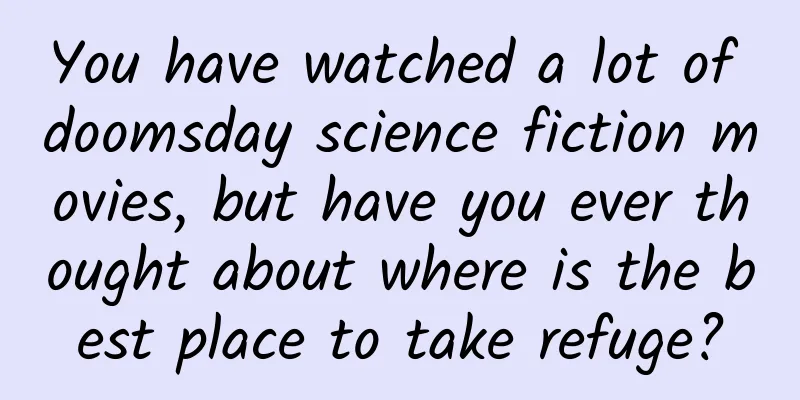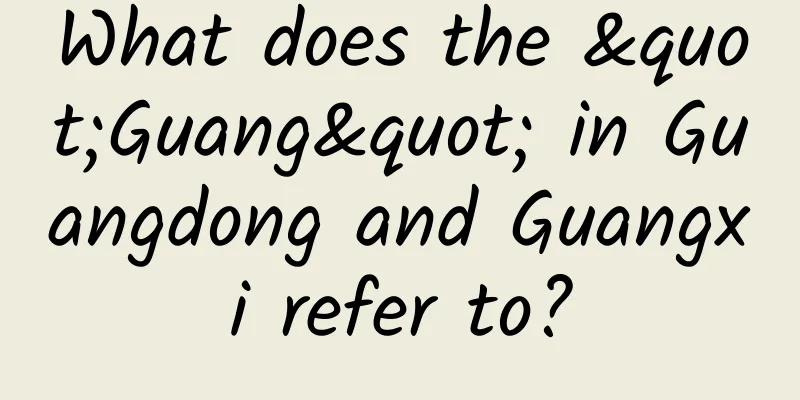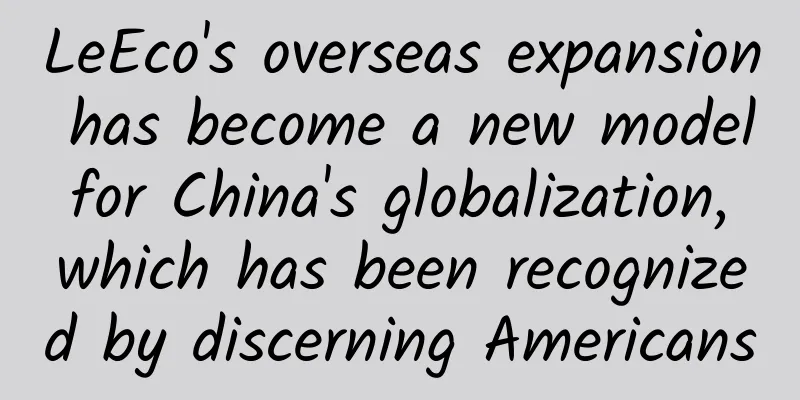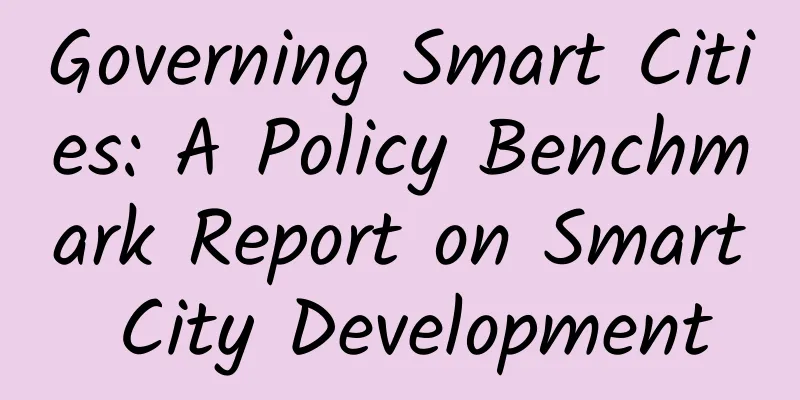You have watched a lot of doomsday science fiction movies, but have you ever thought about where is the best place to take refuge?

|
Written by: Qi Dazai Layout: Li Xuewei If global civilization collapses, where will humanity go? One day, when I was working, I suddenly had an idea. I recalled my panic when the Mayan rumor spread in 2012, and then I fell into sorrow. After a long silence, I opened a certain website with a strong desire for knowledge, hoping to seek help from the masters. As expected, there are indeed many worried companions, and everyone has launched a lot of discussions on the topic of "Why did the earth civilization suddenly fail?" After browsing for a long time, the editor's worries have also increased a lot. I feel like I must be one of the first humans to perish... I think that I should study self-rescue skills in advance and not waste my time slacking off. Then I started searching for the apocalyptic novels and other-worldly travel stories I had read before, to see if there were any skills I could learn. After some recollection, the editor discovered that the protagonists are usually either genius players with cheats, or skilled players with full abilities. A person who always has a bad face when drawing cards, and who is not good at anything except eating, really does not deserve to live in this world. . . Of course, there is another way… that is to get to know the best of the world — Bear Grylls , and hold on to his thighs. Maybe you can survive in that world where you have nothing… At this time, the editor-in-chief sent me a recently published paper on the destruction of Earth civilization, titled "An Analysis of the Potential for the Formation of "Nodes of Persisting Complexity "", and asked me to read and study it. Is this... hope? The editor's world is bright again (although I don't see how this title has anything to do with the destruction of earth civilization... but the editor-in-chief won't lie to me). Let me take a closer look. The study, by Nick King and Aled Jones of the Global Sustainability Institute at Anglia Ruskin University (ARU) in the UK, and published in the journal Sustainability, explains how a combination of ecological damage, limited resources and population growth could trigger a reduction in the overall complexity of civilisation, while climate change is a "risk multiplier" that will exacerbate existing trends. By examining self-sufficiency (energy and manufacturing infrastructure), carrying capacity (land available for farming and total population), and isolation (proximity to other large population centers where migration events might occur), the researchers identified five countries with the most favorable starting conditions for surviving a global collapse: New Zealand, Iceland, the United Kingdom, Australia (particularly Tasmania), and Ireland. These are the countries currently most likely to maintain high levels of social, technological, and organizational complexity within their borders if a global collapse were to occur. Figure丨New Zealand (Source: Internet, please delete if infringement) These five countries have one thing in common: they are all islands or island continents with strong marine climate influences. Therefore, they currently have low variability in temperature and precipitation. Although they will also be affected by climate change, they are most likely to continue to maintain relatively stable climate conditions, thus providing a guarantee for human survival. Figure 丨 Current ratings of countries with the most favorable starting conditions (Source: Sustainable Development) Review of the reasons for the collapse of Earth civilization The author summarizes the possible reasons that may lead to the collapse of Earth civilization. There are no new ideas here, such as the Earth suddenly becomes flat due to the attack of alien civilization; or alien civilizations occupy the Earth and the Earth becomes a battlefield for a monster-killing game, and the monsters are so powerful that humans are basically extinct; or suddenly time and space are dislocated and travel to another world. (Source: Pixabay) Based on a review of the current predicament of human society and previous literature, the study summarizes the following four reasons: 1. Useless - reaching the limit The decline in production from several major oil fields around the world in recent decades, as well as the low rate of discovery of large new hydrocarbon resources, has significant negative implications for limiting key societal functions such as mass logistics. This phenomenon has implications for the ability of global society to adapt to material scarcity, given that constraints on the availability of multiple resources may have to be managed simultaneously, which may limit the ability to substitute and “decouple” resource use. In other words, humans currently do not have the ability to manage the rational use of multiple resources at the same time, because we cannot currently control the use of resources. Against the background of declining output of various resources and low discovery rates, it is very likely that one day the energy will run out, and then the Earth civilization will cease to function. 2. No more profit - reduced returns After the Industrial Revolution, energy reserves became an important factor restricting national development. Therefore, many "elegant" powers started their colonial journey, plundering energy and becoming hegemons. The "surplus" energy provided by high Energy Return on Investment (EROI) also provides conditions for reinforcing feedback mechanisms of capital accumulation, allowing the accumulation of wealth in sub-regions and populations of the world. This phenomenon is quantitatively assessed by applying a predator-prey population dynamics model to evaluate the evolution of four factors ("elites/commoners/nature/wealth"), determining that the plunder of resources and labor by the (economic) "elites" from the "commoners" may lead to economic stratification and ecological tensions, and ultimately to irreversible social collapse. This can be simply explained as "water can carry a boat, but it can also capsize it." When the gap between the rich and the poor reaches an outrageous level and people have been exploited for a long time, society will collapse, leading to the collapse of global civilization. The complexity of modern society may have reached a point where it may be largely incomprehensible to individuals, humans and institutions. This may be reflected in phenomena such as the unpredictable behavior of stock markets, frequent failures in the implementation of “mega-projects” and failure to address challenges of a global scale. 3. Ecological crisis-ecological destruction This is the most understandable crisis. Xi Jinping pointed out in his report at the 19th CPC National Congress that we must uphold the harmonious coexistence of man and nature, establish and practice the concept that green mountains and clear waters are invaluable assets , adhere to the basic national policy of saving resources and protecting the environment, and treat the ecological environment as we treat our lives. 4. Other stacking nature buffs - risk multipliers The sum of human activities and the resulting perturbations of the Earth system generate several phenomena that act as “risk multipliers” that could exacerbate existing trends and feedbacks. Climate change is perhaps the most pervasive of these risk multipliers. Climate change is considered to have a near-certain potential to severely disrupt human civilization, especially given the likelihood of tipping points and nonlinearities occurring within the climate system. Pandemics are another source of risk multipliers. The COVID-19 pandemic that began in early 2020 confirmed the potential threat of coronaviruses that are known to pose risks to humans. The political, economic, financial, and social impact of the COVID-19 pandemic is unclear as it is still ongoing in 2021, but it is likely to be profound and long-lasting given the widespread impact on all aspects of society around the world. The United Nations has warned that future pandemics could be more severe than COVID-19 in terms of virulence, mortality, and other impacts. The risks of crossover from infectious diseases, coupled with unpredictable societal impacts as humans continue to encroach on the planet’s remaining wild areas, clearly demonstrate the crossover risks posed by pandemics. Furthermore, global systems may now be beyond human control or understanding and may therefore be more susceptible to catastrophic patterns of behavior that can propagate through coupled systems through a range of unpredictable mechanisms. “High-quality Human Settlements” Selection Mechanism First, two concepts are introduced: De- Complexification and Nodes of Persisting Complexity . In the paper, the authors point out that - “Decomplexification” is defined as a situation in which the overall complexity of human society on a global scale experiences a large-scale and broad-spectrum (i.e., affecting all parts of society, technological systems, and the environment) reduction. While this concept is central to this study, it is not defined in detail nor quantified. Instead, it is used as a general description that captures the slowing, cessation, or reversal of trends that have characterized recent civilizations, particularly exponential growth in multiple parameters, the “Great Acceleration.” To put it in plain language, it roughly means that the Earth civilization we are talking about suddenly "failed" one day and returned to its primitive state, that is, it became less complicated. The author believes that the society we live in now has a very complex operating system. Countries rely on import and export trade, global exchanges, and the Internet and the Internet of Things that are indispensable in daily life are major factors that exacerbate the complexity. We can understand nodes of sustained complexity as areas that can remain somewhat close to the operation of current society after the collapse of Earth civilization. Getting two important definitions right requires developing a “candidate list” of countries with inherent natural and anthropogenic characteristics. This candidate list needs to take into account the factors most relevant to the potential nature of a “de-complexifying” event, to determine which conditions might interact with such an event to make it more likely that a certain level of complexity would persist. The methodology for determining the "finalist" countries is based on the extrapolation and further analysis of the results of the Notre Dame - Global Adaptation Index (ND-GAIN) study. This study considers a range of factors related to the likelihood of climate change disruptions in different countries around the world. It collects and processes a range of different variables to generate indicators of vulnerability to climate disruptions and readiness to mobilize adaptive actions. Figure | Rating Description (Source: Sustainable Development) After some operations, "high-quality human settlements" were born: New Zealand, Iceland, the United Kingdom, Australia (especially Tasmania) and Ireland. Why are they the ones? In summary, the author believes that these places have the following three advantages: 1) They are all marine climates and will be relatively less affected by major changes in future climate conditions; 2) They have strong carrying capacity, abundant local resources, sufficient energy supply, and sufficient ability to use renewable energy; 3) Because they are island countries, international logistics are relatively expensive, so their dependence on global supply chains is relatively low. Under the above conditions, their respective local scale (mainly energy and agriculture) characteristics are further qualitatively evaluated. The results show that New Zealand is most likely to form a "node of continuous complexity" together with Iceland , Australia (Tasmania) and Ireland also have favorable characteristics, and the United Kingdom presents a more complex situation and may have less favorable characteristics overall. Figure丨Iceland (Source: Internet, please delete if infringement) Professor Aled Jones, Director of the Global Sustainability Institute at Anglia Ruskin University (ARU), said: "In the coming years and decades, Earth's civilisation is likely to undergo significant changes. The impacts of climate change, including increased frequency and intensity of droughts and floods, extreme temperatures and greater population mobility, are likely to determine the severity of these changes." “In addition to showing which countries we think are best placed to manage such a collapse – which will undoubtedly be a profound, life-changing experience – our research aims to highlight that actions to address the interconnected factors of climate change, agricultural capacity, domestic energy, manufacturing capabilities and over-dependency complexity are necessary to boost resilience in countries that do not have the most favourable starting conditions.” China is not included in this list. The editor believes that this study may to some extent ignore the high-quality hands-on masters among the Chinese people, such as Liziqi, Geng Shougong , etc., and also ignore the survival ability of the general public. Of course, there are many theoretical factions about the collapse of earth civilization. According to scientists' research, the time we can still happily eat can be long or short. However, the deterioration of the ecological environment, global warming and sea level rise are real, and we have also deeply experienced the power of pandemics. Therefore, it is always right to protect the environment from myself. It is also very good to learn necessary survival skills such as farming, swimming, and moving bricks in spare time. Perhaps, one day, we can also be the superman who saves world civilization... References: https://phys.org/news/2021-07-zealand-survive-collapse.html https://www.mdpi.com/2071-1050/13/15/8161/htm |
>>: Chinese Doctors’ Day | Today, say “thank you” to them!
Recommend
Did you know that people who love to chat are less likely to develop dementia?
Author: Sun Taixin, Chief Physician, Beijing Elec...
What is image promotion? How to do image promotion?
In the Internet age, image display ads are becomi...
Urticaria is common in spring. How to get rid of it?
The weather is getting warmer and the days are ge...
What are the operational strategies behind free and paid products?
Between 2013 and 2014, when Xiaomi CEO Lei was pr...
How to improve user loyalty to products?
This is a "red ocean era". Due to the r...
Xiaohongshu brand content keyword analysis
It has become a consensus that brands can seize t...
Why Android apps start slowly? Xiaomi engineers blame Taobao
There have always been comments about the poor an...
How to play information flow advertising? It took 300,000 yuan to summarize the experience!
Industry Overview: According to incomplete statis...
When a jellyfish is stretched straight, it is taller than a 10-story building? You read that right, it is a jellyfish
Have you ever seen a jellyfish taller than a ten-...
Starting from Dash iOS open source, don’t pursue perfect code too much
(Screenshot of Dash iOS source code) Some time ag...
Performance comparison of the three major operators: China Unicom lags behind while China Mobile dominates
Last week, China's three major telecom operat...
It can make you sweet, but it can also make you acutely poisoned...
Did you know that the elements can be deceiving? ...
Do you feel pain when riding? Learn the correct riding posture →
The weather is getting warmer More people are rid...









